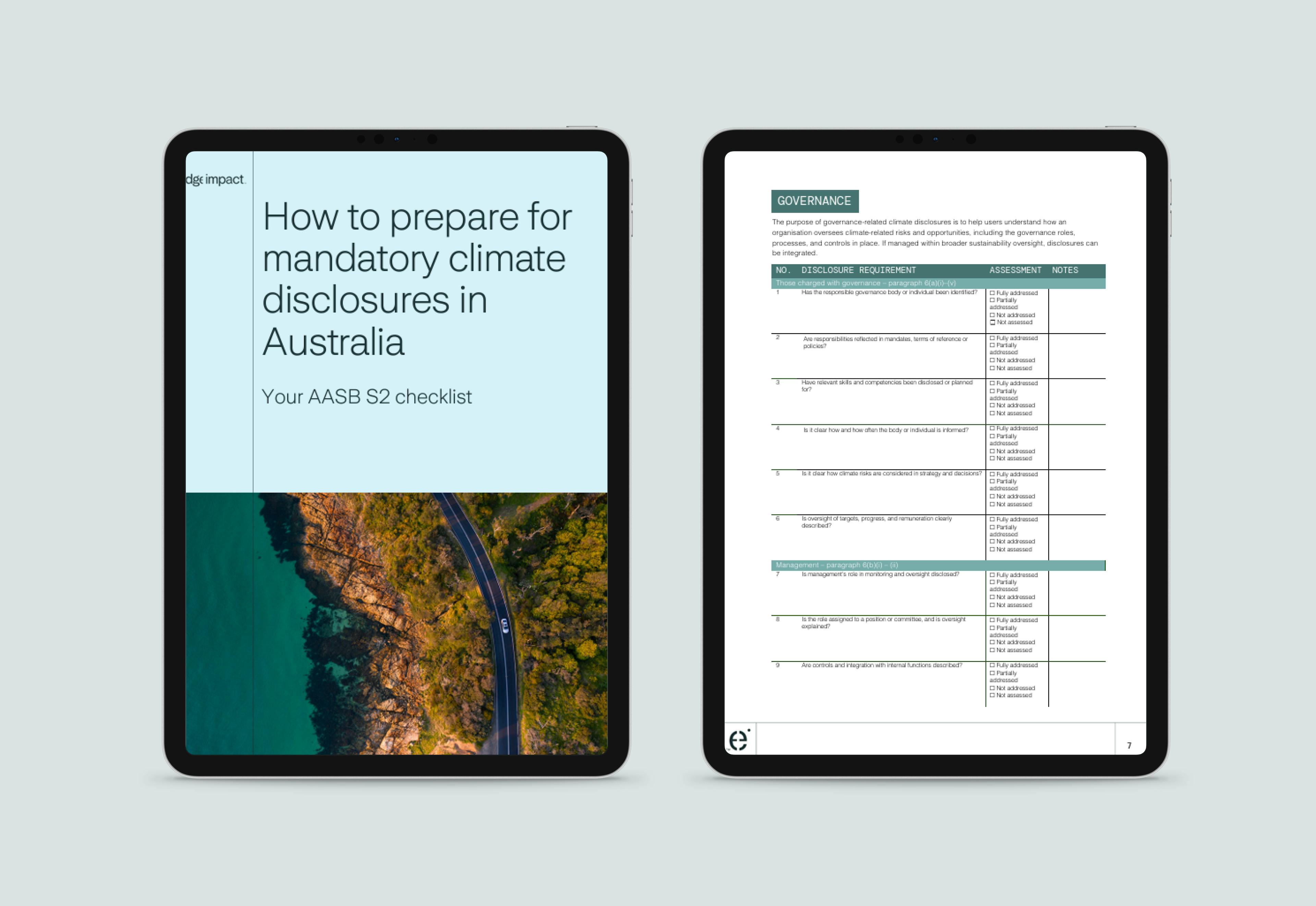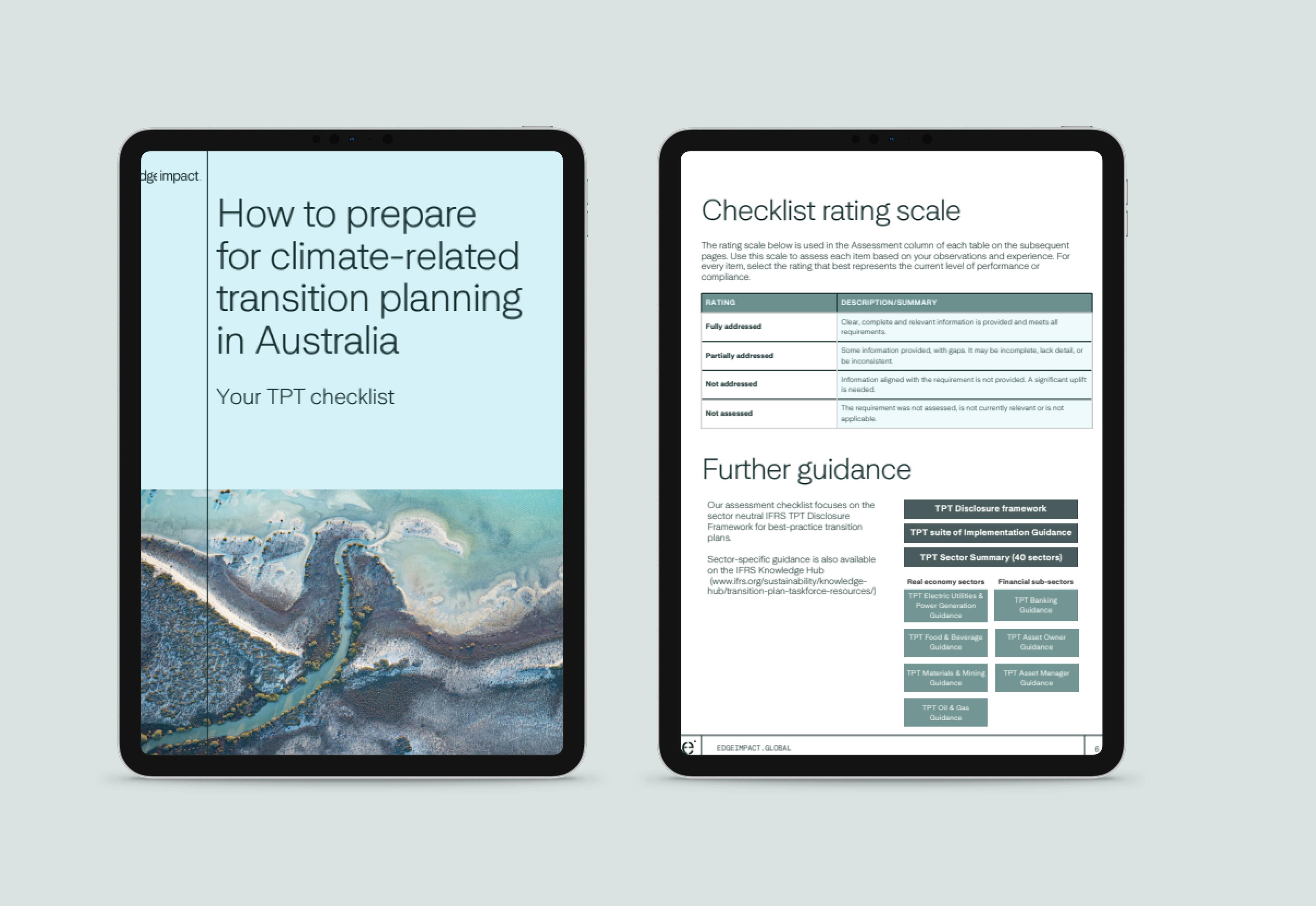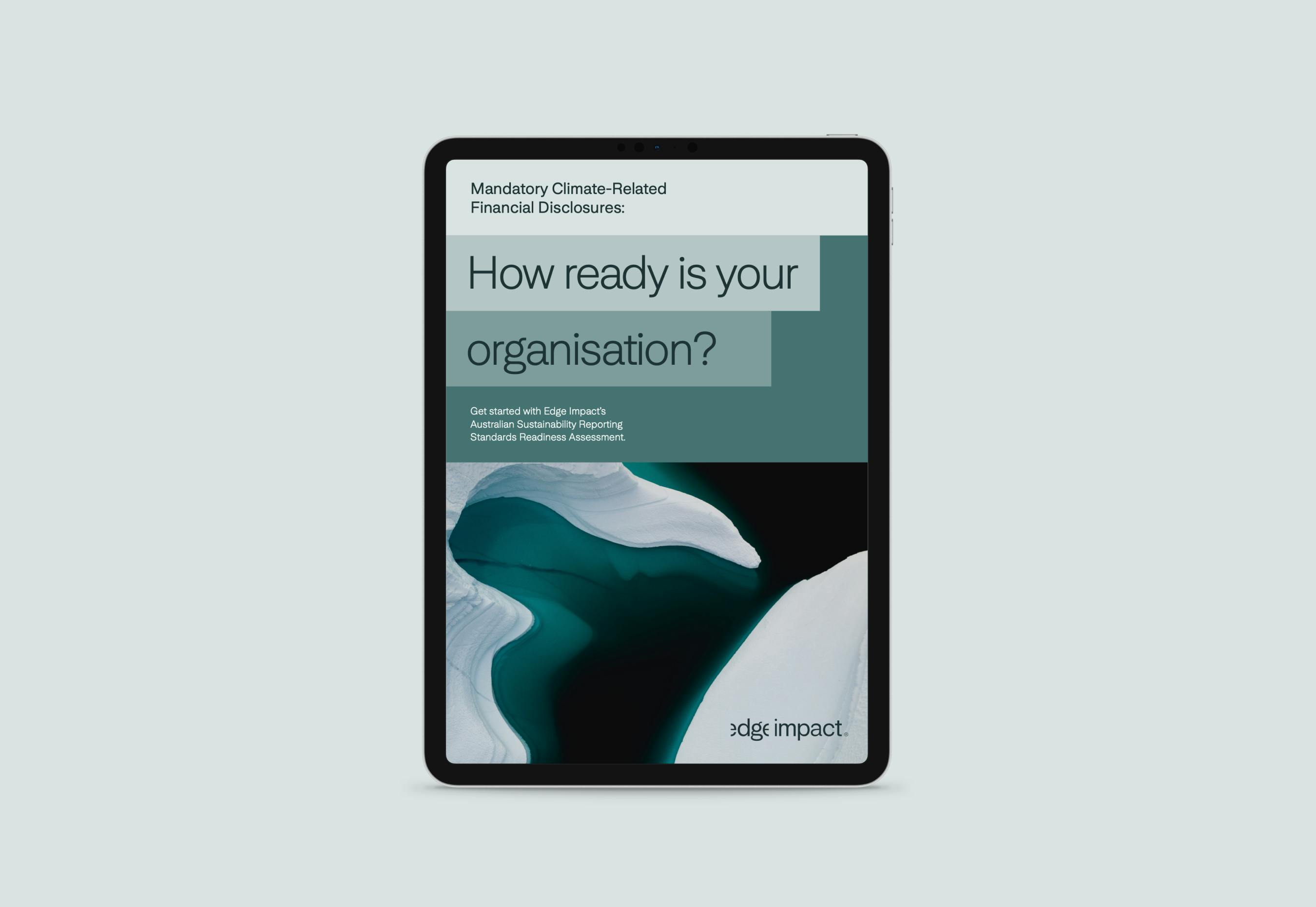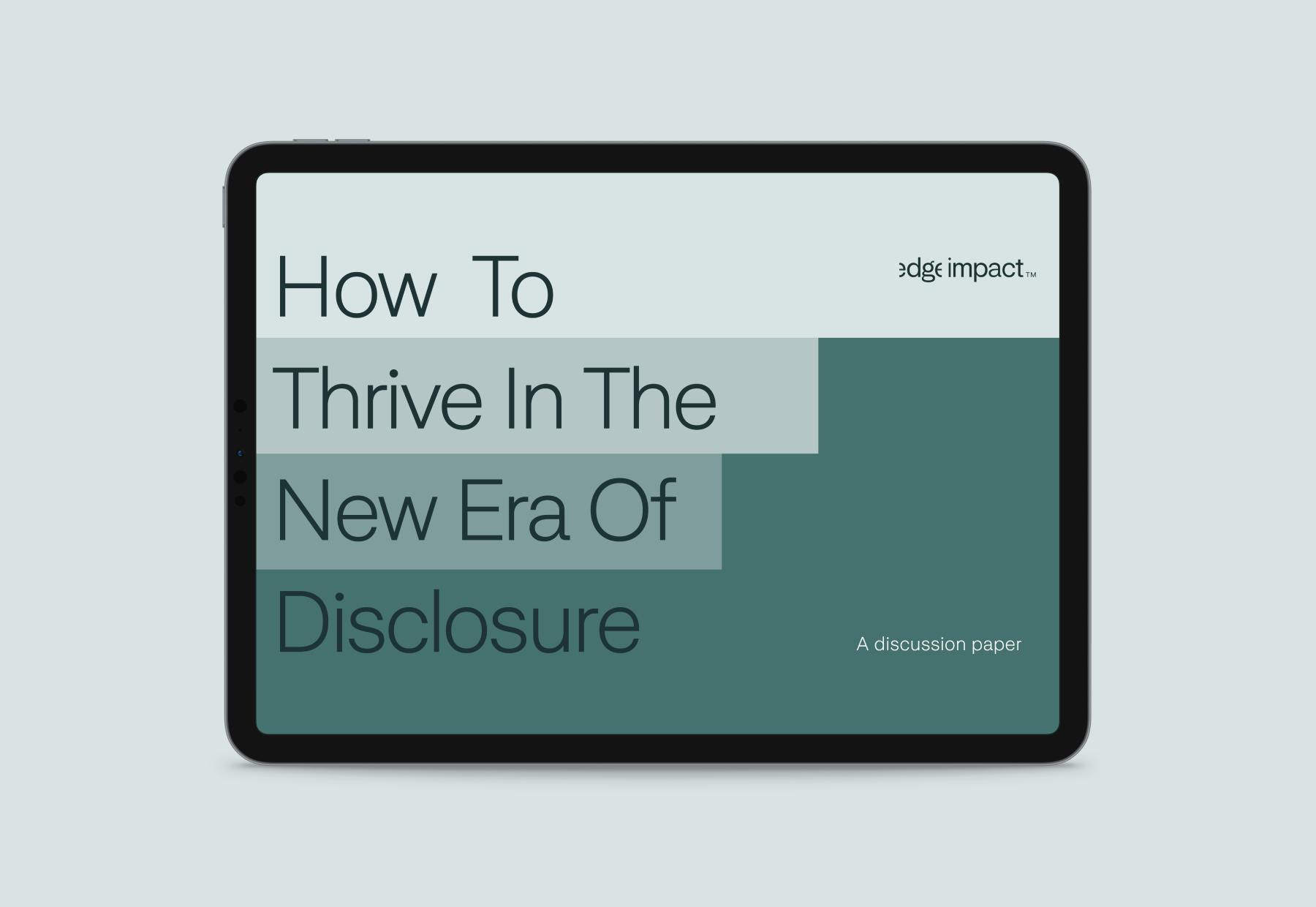Mandatory Climate-Related Financial Disclosures
How ready is your organisation?
Edge Impact has been conducting climate risk reporting and disclosure assessments for over 15 years across diverse sectors and industries.
Explore our practical resources designed to help your organisation prepare for mandatory climate reporting in Australia, understand new climate compliance requirements, and navigate upcoming climate related financial disclosures with confidence.

Climate Reporting Legislation Passed by Parliament
On 9 September 2024, the legislation to enact Australia’s mandatory climate related financial disclosures regime was passed by Parliament, effective for financial years beginning on or after 1 January 2025.
As significant as this change is, it also marks a critical step in the transition to net zero. The new mandatory climate reporting requirements will enable financial stakeholders and markets to be more fully informed of climate-related risks and opportunities, ultimately supporting investment in a low-carbon economy.
Described by ASIC Chair, Joe Longo, as the ‘biggest change to financial reporting in a generation’, the legislation highlights why organisations must act now. Those who are proactive in preparing for climate risk disclosure are already seeing benefits, while others risk higher compliance costs and exposure.
What does this mean for you?
- For Group 1 entities, reporting periods commencing on or after 1 January 2025 will be required to include detailed disclosures about your climate-related risks and opportunities in line with the Australian Sustainability Standard Board (ASSB) S2. Group 2 and 3 entities will be phased in from 1 July 2026 and 2027.
- Disclosures must be made annually in a sustainability report, as part of your annual reporting suite. They must also be issued on the same date as your financial reporting.
- Your first year of disclosures will also have assurance requirements, limited assurance is required for your scope 1 and 2 emissions in the first year.
- Directors will be required to state whether, in their opinion, the company’s sustainability report complies with the legislation.
What should you do to prepare?
- Engage your board and executive team early to assess your readiness.
- Undertake a readiness assessment to map gaps and build a climate disclosure roadmap.
- Confirm you have the right partners for this transition, including climate specialists, auditors, and legal advisors.
The Edge Impact AASB S2 Compliance Checklist
From January 1, 2025, climate-related financial disclosures are mandatory for Australian organisations.
The legislation aligns with the International Sustainability Standards Board (ISSB) framework (IFRS S1 and IFRS S2), with modifications to ensure they are fit for purpose in Australia.
The two key standards are:
- AASB S1: A voluntary standard covering general sustainability disclosures.
- AASB S2: A mandatory standard covering climate-related financial disclosures.
Under these new requirements, companies must move quickly to strengthen their climate governance, risk assessment, metrics, and reporting to ensure compliance and reduce future risk.
Inside this guide, you’ll find:
- An overview of the key AASB S2 requirements
- Thresholds and timelines you need to know
- A practical compliance checklist
- Insights into how Edge Impact can help your organisation adapt with confidence
Download the AASB S2 Checklist

The Edge Impact TPT Disclosure Framework Checklist
Transition planning is becoming an essential part of corporate strategy as organisations prepare for a low-carbon, climate-resilient economy.
A credible transition plan helps businesses manage long-term climate risks and opportunities, set clear ambitions and targets, and communicate a transparent pathway to achieving them.
The IFRS Transition Planning Taskforce (TPT) Disclosure Framework represents international best practice for robust, transparent, and decision-useful transition plan disclosures.
Designed to complement the International Sustainability Standards Board (ISSB) climate-related disclosure standard, IFRS S2, the TPT Framework supports organisations to disclose material information on climate risks and opportunities.
In Australia, the Government’s draft voluntary guidance encourages companies to structure their transition plans in line with this framework, helping to build credibility with investors, regulators, and stakeholders.
Inside this guide, you’ll find:
- An overview of effective transition planning and the role it plays in climate strategy
- A practical checklist to assess alignment with the IFRS TPT Disclosure Framework
- Insights into how Edge Impact can help your organisation design a credible, actionable transition plan
Download the TPT Disclosure Framework Checklist

Does your advisor on climate risk and disclosure have the expertise to guide your ASRS journey?
Edge Impact is ready to support you and your company in navigating climate risk assessments and disclosures with confidence.
The top three questions we’re asked about Climate Risk Assessments:
Join Dr. Mark Siebentritt, our Global Climate Practice Lead, as he addresses:
- Getting Started: How to begin your climate risk assessment with a clear, structured approach.
- Information Sources: Where to find the critical data needed for accurate and credible assessments.
- Selecting Scenarios: How to identify and apply the right climate scenarios for your business needs.
Learn more about our Readiness Assessment & Roadmap service in our downloadable guide.
Complying with the New Sustainability Reporting Standards
To support organisations through this transition, Edge Impact has developed a range of practical guides, tools, and expert services.
Each resource is designed to take you step by step through the sustainability reporting process, helping ensure a smooth and comprehensive compliance journey.
The Edge Impact ASRS Readiness Assessment and Roadmap Service
Depending on the size and complexity of your organisation, identifying material climate risks and opportunities, and understanding their potential impact on financial performance, can take considerable time and effort.
When approached effectively, however, this process delivers benefits well beyond compliance with disclosure standards, offering both strategic and operational advantages.
The first and most significant step is understanding what you already have in place and what additional actions are required to comply with the Australian Sustainability Reporting Standards (ASRS). This can be achieved through the Edge Impact ASRS Readiness Assessment and Roadmap.
Benefits of completing a readiness assessment include:
- Early engagement and upskilling of leadership on ASRS requirements
- Confirmation of relevant reporting jurisdiction and associated standards
- Detailed planning for internal and external resourcing needs, including budgeting and recruitment to meet deadlines
- Coordination of responsibilities across business functions, including finance, risk, executive and board
- Integration of climate risks into enterprise risk management systems
- Reduced future compliance costs through stronger internal capability
Download the ASRS Readiness Assessment Guide

With our in-depth knowledge of reporting standards, whether ISSB, CRSD or ASRS - our readiness assessment process will consider which standards are relevant for your business.
Contact Mark Siebentritt, our Global Practice Lead for Climate or get in touch here.
How to Thrive in The New Era of ESG Disclosure
Max Van Biene, Global Head of Client Impact at Edge Impact,
explores the upcoming Mandatory Climate-Related Financial Disclosures:
The Edge Impact ESG Disclosure Discussion Paper, co-authored by our team of sustainability experts, provides a clear guide to navigating the changing landscape of ESG reporting.
Regulatory body ASIC has urged organisations to prepare early for mandatory ESG disclosure and will be releasing additional guidance and resources in the coming months. Our paper sets out what a three-phase roadmap to compliance looks like, helping your organisation act now rather than wait.
Inside, organisations will find:
- A Forward-Focused Perspective: Insights into the new era of ESG disclosure and its implications, positioning your organisation for long-term success.
- A Strong Foundation for Compliance: Guidance on developing a robust three-year disclosure roadmap to manage risk and capture new opportunities.
- Practical Steps for Immediate Action: Actionable strategies to help organisations prepare now for upcoming mandatory reporting obligations.
Download the Discussion Paper

Roadmap to Compliance: Navigating Mandatory Climate-Related Financial Disclosure
Mark Siebentritt, Global Practice Lead, Climate, alongside industry experts explore the critical aspects of mandatory climate-related financial disclosure and discusses the practical implications of upcoming reporting regulations for sustainability teams, finance teams, and risk teams alike.
As the compliance deadline for Group 1 entities in 2025 approaches, it is crucial not only to grasp the theoretical aspects but also to understand the actionable steps organisations must take.
Disclaimer: The information provided in these documents are general in nature and does not constitute legal or financial advice. Organisations that are required to comply with these emerging regulations should obtain their own independent legal and financial advice about their reporting requirements.
Related Articles: Everything you need to know in 2024 in relation to ESG Disclosure & Reporting



To learn more about our work in climate disclosure, ESG reporting, and climate risk contact Mark Siebentritt at mark.siebentritt@edgeimpact.global or submit your enquiry here.




